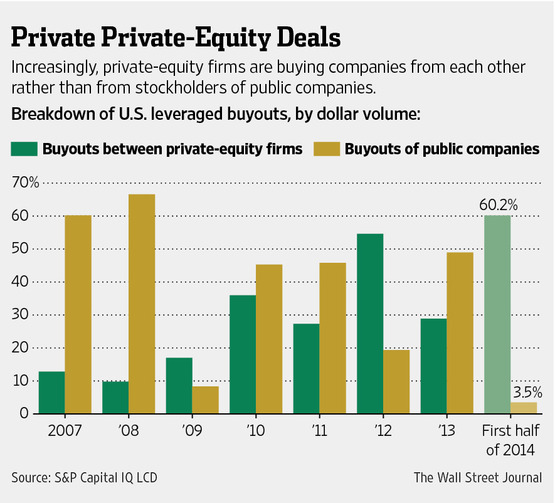|
THE WALL STREET
JOURNAL. |
MARKETS
|
Markets
Buyout Shops Look to Rivals for
Deals
|
|
By
Ryan Dezember
July 30, 2014 5:20
p.m. ET
Private-equity firms have all but stopped buying public companies,
retreating from a cornerstone of their business as rising stock prices
push acquisition targets out of reach.
Public companies taken private accounted for 3.5% of the $89 billion
of U.S. leveraged buyouts in the first half of this year, the lowest
share on record, according to data tracker S&P Capital IQ LCD. In the
first half of 2008, at the apex of a buyout boom, these types of deals
represented about 68% of all buyouts by dollar volume.
Instead, private-equity firms are buying companies from one another, a
shift driven in part by the relative simplicity of completing an
acquisition of a private company compared with a publicly traded one.
Transactions between private-equity firms have made up 60% of U.S.
leveraged buyout volume through June, according to S&P. That is a
higher percentage than the ratio for any full year tracked by the
firm, whose data date to 2002.
Overall dollar volume of U.S. leveraged buyouts through June was up
30% over the same period a year ago.
Carlyle Group
LP this week said it would buy Acosta Inc., a marketing firm that
helps consumer-goods companies launch products and track sales, from
Thomas H. Lee Partners LP. Carlyle is paying roughly $4.8 billion,
according to people familiar with the matter, making the deal one of
the year's largest buyouts.
The Jacksonville, Fla., company has had four private-equity owners
since 2004, including Carlyle, an increasingly common occurrence for
businesses that generate enough cash to keep up with payments on the
debt that private-equity firms use to buy and extract dividends from
companies.
The trend marks a big change from earlier eras of private equity, when
buyout firms plucked multibillion-dollar companies off the stock
market with regularity. The bidding war leading up to KKR & Co.'s $25
billion buyout of RJR Nabisco Holdings Inc., in 1988, was detailed in
a best-selling book, "Barbarians at the Gate," and a movie.
That deal opened the door to a burst of public-company takeovers in
subsequent years and in the run-up to 2007's financial crisis.
The handful of public companies to go private this year are tiny in
comparison. The largest deal has been
Apollo Global Management LLS’s
$1.3 billion takeover of Chuck E. Cheese parent CEC Entertainment Inc.
The other four, a maker of robotic cutting tools and a real-estate
developer among them, cost private-equity buyers less than $400
million apiece.
"There have been some lessons learned," said David Mussafer, managing
partner at Advent International, which is investing a $10.8 billion
fund. "The badge of honor comes from the returns you generate for your
fund, not the size of the deal."
Private-equity firms combine investors' cash and borrowed money to buy
companies with the aim of selling them profitably a few years later.
Public companies have historically been a top target, along with
family-owned businesses and divisions carved out of corporations.
Purchases of companies owned by buyout industry rivals aren't new, but
they have become more frequent.
Higher stock prices are one reason, as they drive up public-company
valuations. After a number of large deals backfired on private-equity
firms amid the financial crisis, the companies since then have
generally shied away from big buyouts.
The S&P 500 index soared 30% in 2013 and is up 6.6% this year.
Plus, with the rise of acquisition activity this year, corporate
buyers who for long sat on the sidelines are now competing for deals.
Some say the private deals are proving good for business. On a call
Wednesday discussing Carlyle's second-quarter results, co-Chief
Executive David Rubenstein said returns on these deals "have been
pretty robust for investors in recent years, and I think, therefore,
you're likely to see more."
Private-equity executives also say deals with peers are simply easier.
The stock market's run has prompted private-equity firms to seek ways
to cash out of older investments in droves, making these firms
motivated sellers, unlike many public companies that resist takeovers.
And public-company buyouts are more complex. They can require
postagreement auctions, called "go-shop" periods, in which boards seek
higher offers. Shareholders must approve deals. Lawsuits from
shareholders challenge nearly every deal. Activist investors can enter
the fray and agitate for higher prices.
"If you have a choice between a public company and a private company
in the same industry, certainty of closing is much greater in a
private deal," said Mel Cherney, co-chairman of the corporate
department at law firm Kaye Scholer LLP.
Meanwhile, private-equity firms need to find companies to buy, if not
public, then private. They have about $326 billion to put to work in
buyouts, according to data provider Preqin.
Criticism of deals between firms has focused on what value one manager
can bring after another has owned the company.
Mr. Rubenstein of Carlyle on Wednesday said that the deals "have had
their ups and downs in terms of the way that people look at them" and
the key is to "have a good management approach and a plan when you're
buying."
A 2012 study by three European researchers compared the results of
more than 5,300 leveraged buyouts from 1986 to 2007 and found that
there often wasn't a big difference in performance between the 435
deals made between investment firms and buyouts of companies with
other types of owners.
The researchers said the downside of these deals is limited, and so,
too, is the upside.
Write to
Ryan Dezember at
ryan.dezember@wsj.com
|
